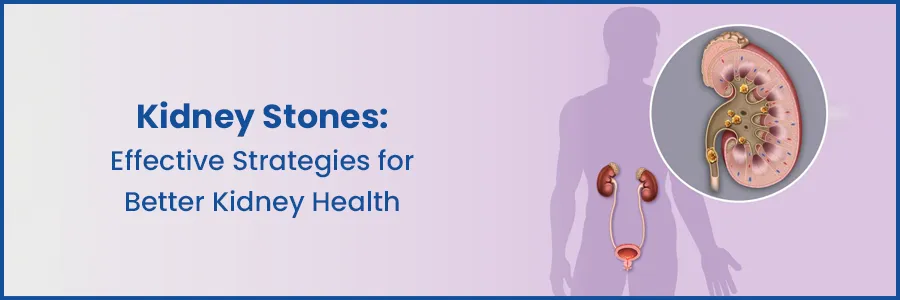Title: Kidney Stones: Effective Strategies for Better Kidney Health

Kidney stones can be excruciatingly painful and disrupt your daily life. These small, hard mineral deposits can form in your kidneys and cause intense discomfort as they travel through your urinary tract. While treatment options are available, prevention is always better than cure for kidney stones. Adopting effective strategies can significantly reduce your risk of developing these painful formations. In this article, we'll explore a range of proactive measures you can take to bid farewell to kidney stones and enjoy better kidney health.
Understanding Kidney Stones
Before delving into prevention strategies, it's essential to understand what kidney stones are and how they form.In your urinary tract, solid aggregates of minerals and salts crystallize and group together to form kidney stones. They can vary, from as small as a grain of sand to as large as a marble. The stones can cause severe pain, nausea, and vomiting and even lead to complications if not addressed promptly.
Effective Strategies for Prevention
- Hydration is Key : One of the easiest yet most important methods for preventing kidney stones is to drink enough water. By reducing the quantity of minerals in your urine, drinking enough water can help prevent crystals from forming and combining to form rocks. Aim to consume at least eight glasses (or 2 liters) of water every day, and modify your intake according to the weather and your level of exercise.
- Watch Your Diet : Kidney stone production is significantly influenced by diet.Certain foods are high in oxalates, which can contribute to stone development. Limiting your intake of spinach, beets, chocolate, and nuts can help reduce your risk. Reducing salt and processed foods can also lower sodium intake, preventing excessive calcium buildup in your urine.
- Increase Calcium Intake Wisely : Contrary to popular belief, consuming enough dietary calcium can help prevent kidney stones. Calcium binds to oxalates in your digestive tract, reducing their absorption into the bloodstream and decreasing the risk of stone formation. Opt for calcium-rich foods like low-fat dairy products, fortified plant-based milk, and leafy greens.
- Choose Lean Proteins : Diets high in animal proteins can increase uric acid and calcium excretion, both of which contribute to kidney stone formation. Consider incorporating lean protein sources like fish, poultry, tofu, and legumes into your diet while reducing your consumption of red meat and processed meats.
- Moderate Oxalate Intake : While it's not necessary to eliminate high-oxalate foods, moderation is key. Cooking or steaming oxalate-rich vegetables can help reduce their oxalate content. Pair these foods with calcium-rich options to minimize oxalate absorption.
- Stay Active : Numerous health advantages come from regular exercise, one of which is a decreased chance of kidney stone development. Exercise promotes good weight management and can reduce certain urine constituents that can lead to the formation of kidney stones.
- Limit Soda and Sugary Beverages : Sugary beverages, including sodas and certain fruit juices, can increase your risk of kidney stones. The high fructose content can lead to higher uric acid levels and contribute to stone formation. Opt for water, herbal teas, and natural fruit-infused water instead.
- Monitor Medications : Your risk of kidney stones may be increased by some drugs and supplements. Discuss your medications with your healthcare provider if you're prone to stone formation. They can help adjust your regimen if necessary to minimize this risk.
Conclusion
You may dramatically lower your risk of acquiring kidney stones and experience improved kidney health by implementing these useful methods. Remember that prevention is an ongoing effort that requires consistency and dedication. Make mindful choices about your diet, hydration, and lifestyle to say goodbye to kidney stones and welcome a healthier, pain-free future. If you have a history of kidney stones or specific health conditions, consulting with a healthcare professional can provide personalized guidance tailored to your needs.
Medicover Hospital demonstrates a commendable level of expertise in treating kidney stones through its specialized urology department, advanced diagnostic capabilities, personalized treatment approaches, multidisciplinary collaboration, patient-centric focus, and potential involvement in research and innovation. For the most accurate and current information, it's advisable to visit Medicover Hospital's official website or directly contact their urology department to learn more about their expertise in kidney stone treatment.
